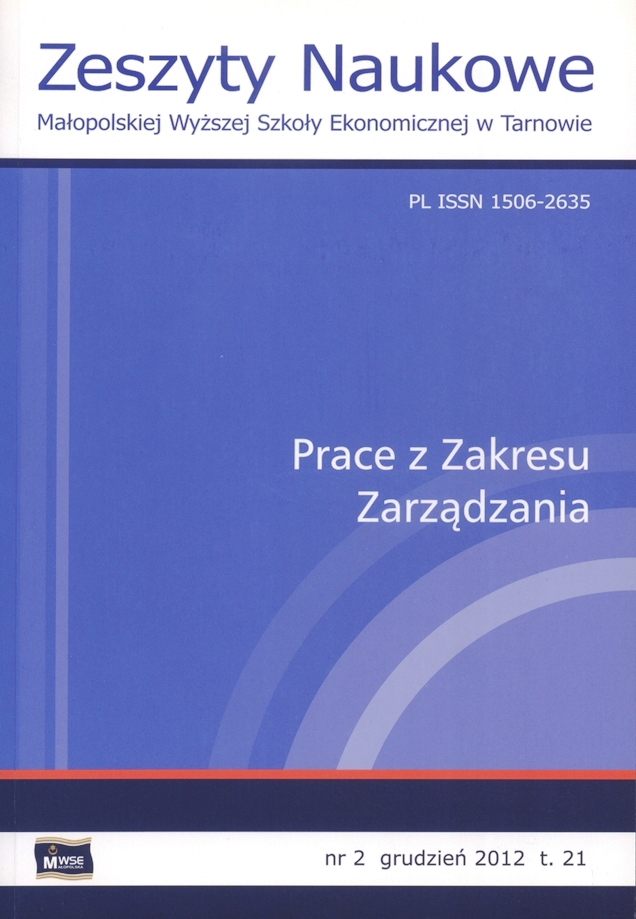Abstract
Enterprises use and develop their potential, which provides the basis of their innovation. The most important resource is knowledge, closely related to the development of human capital and technology which have always been essential factors influencing the development of the company. The formation of knowledge in a company is associated with obtaining data and processing it into some specific information, which consequently creates or enriches knowledge. The aim of this article is to show the importance of knowledge in the development of business innovation activities. The first part of this article presents the basic concepts of knowledge and its classification. Also the spiral model of knowledge in organizations has been presented. The article assumes that the innovation is a relational activity between individuals and institutions, expressed through individual actions or a series of individual and institutional actions. The second part of the article presents the results of empirical research on innovation and the influence of innovation on the overall business income. This section presents the evaluation of the relationships between the positions in organizations and the correlated use of knowledge in the process of creating innovation. The goal of each organization is continuous development of the company through the process of innovation. However, this process requires companies to stay receptive to new ideas and cooperation with other entities. Creating an adequate network of knowledge enables enterprises to acquire knowledge from outside and share it inside the organisations thus contributing to their innovation.
References
Borowska-Pietrzak A., Kawka T, Innowacyjność w realizacji funkcji personalnej w organizacji nowej gospodarki, "Współczesne Zarządzanie: kwartalnik środowisk naukowych i liderów biznesu", Kraków 2012, nr 2.
View in Google Scholar
Hall C.M., Williams A.M., Tourism andInnovation, Routledge, London 2008. ISBN 978-0415-41404-3.
View in Google Scholar
Innowacyjność 2010 [online], Polska Agencja Rozwoju Przedsiębiorczości, Warszawa 2010. ISBN 978-83-7633-025-9 [dostęp 10.11.2012]. Dostępny w Internecie: http://www.parp.gov.pl/files/74/81/380/10838.pdf.
View in Google Scholar
Inteligentne organizacje - zarządzanie wiedzą i kompetencjami pracowników [online], Polska Agencja Rozwoju Przedsiębiorczości, Warszawa 2010. ISBN 978-83-928567-7-1 [dostęp 10.11.2012]. Dostępny w Internecie: http://pi.gov.pl/PARPFiles/file/Raporty/20110103_Raport_Inteligentne_organizacje-zarzadzanie_wiedza_i_kompetencjami_pracownikow.pdf.
View in Google Scholar
Kozioł L., System innowacyjności współczesnych przedsiębiorstw, "Zeszyty Naukowe Małopolskiej Wyższej Szkoły Ekonomicznej w Tarnowie" 2009, nr 1 (12).
View in Google Scholar
Marszałek-Surówka D., Rola wiedzy w kreowaniu innowacji. W: Mikuła B. (red.), Historia i perspektywy nauk o zarządzaniu, Fundacja Uniwersytetu Ekonomicznego w Krakowie, Kraków 2012. ISBN 978-83-62511-61-7.
View in Google Scholar
Nonaka I.,Takeuchi H., Kreowanie wiedzy w organizacji. Jak spółki japońskie dynamizują procesy innowacyjne, przeł. E. Nalewajko, Poltex, Warszawa 2000. ISBN 83-86890-99-1.
View in Google Scholar
Podręcznik Oslo. Zasady gromadzenia i interpretacji danych dotyczących innowacji, Publikacja OECD i Eurostatu, wyd. 3, Ministerstwo Nauki i Szkolnictwa Wyższego, Departament Strategii i Rozwoju Nauki, Warszawa 2008. ISBN 978-83-61100-13-3.
View in Google Scholar
Pomykalski A., Zarządzanie procesem innowacji. Wybrane kierunki badawcze. W: Lachowicz S., Nogalski B. (red.), Osiągnięcia i perspektywy nauk o zarządzaniu, Wolters Kluwer business, Warszawa 2010. ISBN 978-83-7526-733-4.
View in Google Scholar
Rumniak P., Aktywa wiedzy. W: Stabryła A., Wawak S. (red.), Metody badania i modele rozwoju organizacji, Mfiles.pl, Kraków 2012. ISBN 978-83-931128-9-0.
View in Google Scholar
Stabryła A. (red.), Doskonalenie struktur organizacyjnych przedsiębiorstw w gospodarce opartej na wiedzy, C.H. Beck, Warszawa 2009. ISBN 978-83-255-0237-9.
View in Google Scholar
Wojtowicz A., Kozioł L., Koncepcja aliansów wiedzy w procesie innowacji, "Zeszyty Naukowe Małopolskiej Wyższej Szkoły Ekonomicznej w Tarnowie" 2012, nr 1 (20).
View in Google Scholar
© Copyright by Małopolska School of Economics in Tarnów. The articles are available under the Creative Commons Attribution NonCommercial-NoDerivatives 4.0 International License


